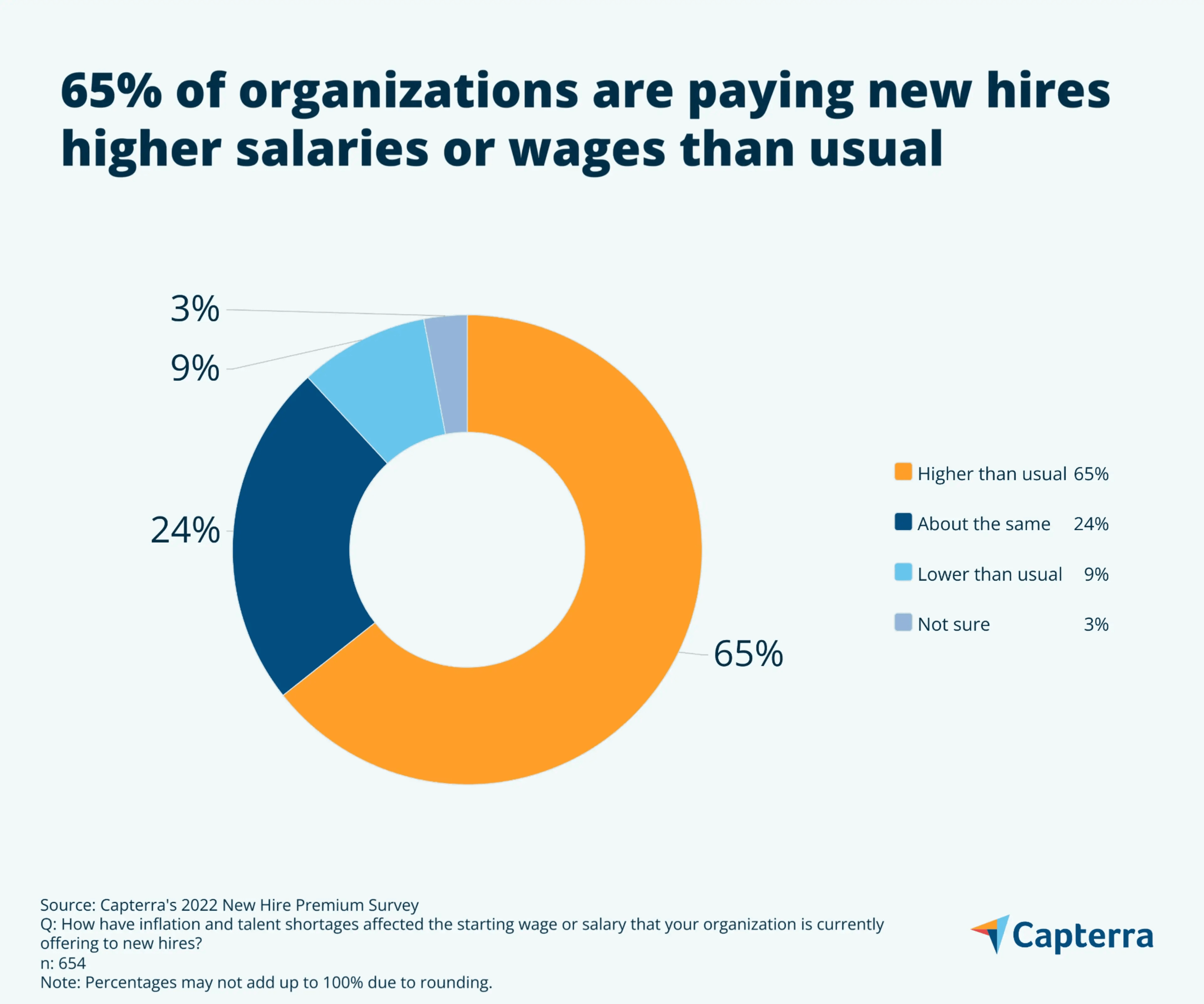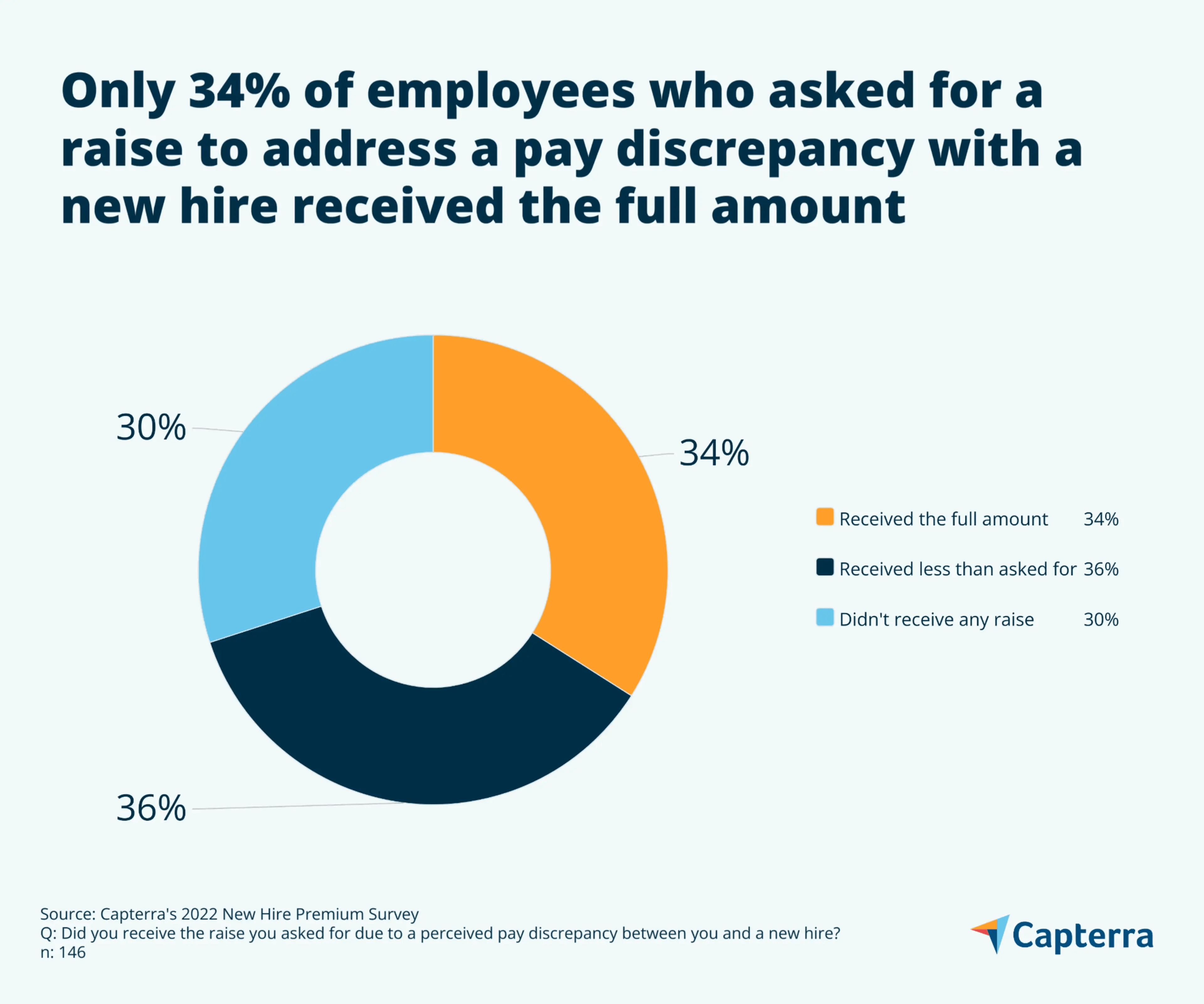Employee retention is a hot topic these days, and we’re here to address yet another issue adding to employers’ struggle: pay inequality.
Rising inflation and an increasingly competitive market mean many employers are boosting new hire starting salaries—much to the dismay of some employees. In a recent survey by Capterra, 68% of hiring managers report having at least one employee ask for a raise or threaten to leave over a pay discrepancy in the last year.
The survey gives insight into what can become a costly hiring cycle: higher starting wages have current employees looking elsewhere for a pay raise of their own, leaving companies scrambling to find (and afford) more new hires.
According to Brian Westfall, principal HR analyst at Capterra, “Companies have to increase new hire pay, as inflation and labor shortages are forcing their hand. But organizations need to be prepared if and when tenured employees understandably raise a stink over pay discrepancies.”
Finding the balance between meeting market demand and retaining existing employees can seem impossible. But it doesn’t have to be.
The key to striking the balance is to first understand how employees view compensation packages in today’s market and how that affects the hiring cycle. The next step is to discover realistic ways you can keep employees happy (hint: they don’t all involve pay raises across the board).
Keep your people engaged and on board
Build online courses and help them grow their careers with TalentLMS.
The training platform that users consistently rank #1.
Compensation packages as a negotiation tool
According to Capterra’s survey, 65% of hiring managers report their organization is offering higher-than-usual starting salaries due to labor shortages and inflation.

Employees are negotiating (and getting) better compensation packages because of current market conditions. For instance, some of the reasons starting salaries are up can be attributed to the following:
- Recession fears. Inflation has economists and others talking about possible economic recession, which leads some people to worry about their financial health. They’re looking to secure an income that can support them as prices and interest rates continue to rise.
- Greater choice. The rise in remote work means people don’t have to choose between living in a low-cost area with a low salary and living in a high-cost area with a higher salary. They can pursue higher-salary jobs independent of where they live. And they have the luxury of passing over lower-paying local options.
- More demand than supply. On the heels of the pandemic and the “great resignation,” many companies continue to face a talent shortage. Those working in in-demand fields may expect higher offers as employers compete for the shrinking candidate pool.
Companies can address these issues by meeting new employees’ compensation demands. However, without careful handling, boosting pay may lead to struggles to keep their current organization running smoothly and, in the end, could cost them even more. Here’s how.
How pay inequality in the workplace creates a vicious hiring cycle
Westfall elaborates on the dangerous hiring cycle mentioned earlier: “Companies raise new hire pay, current employees don’t always get a raise to compensate, then those employees go somewhere else that’s raising new hire pay to start the cycle all over again..”
The cycle he’s talking about happens when perceived salary gaps aren’t addressed.
According to the survey, employees are aware of pay inequality. Nearly half (45%) of employees polled say they believe their company is offering higher than usual pay to new hires. Plus, salary discussions are not as taboo as they once were, and employees are openly talking about pay differences. Two-thirds of employees polled reported comparing salaries with coworkers.
While 68% of hiring managers reported employee requests for more pay, only 34% of employees who asked for a pay increase due to a discrepancy with a new hire’s wages received the raise they asked for.

Whether employers are reluctant or unable to meet tenured employee demands, failure to even out the compensation field can cause hard feelings. Employees want to feel valued and supported at work.
To retain your top talent, show them how much you value them by addressing their concerns.
4 tips for addressing pay inequality and stopping the hiring cycle
How can you address concerns and even out compensation in your organization? The most obvious answer is to review salaries and immediately correct any pay gaps. But if you’re already struggling to keep compensation budgets in line, more money isn’t always an option.
However, with mindful attention to employee needs and careful planning, you can address the issue, keep current employees happy, and meet market demands.
Here are four tips for breaking the hiring cycle.
1. Generate regular reports and make informed decisions
Do regular compensation audits to get a fair picture of where employees stand. You don’t want to create huge pay gaps that you won’t be able to close later.
So review salaries at least once a year, and if you find large gaps, make a plan to close or reduce the discrepancies as needed. When you review salaries, make sure to take into consideration predictions and plans about future promotions and changes in job roles.
2. Communicate transparently
Make sure you have the hard data to support your decisions, and don’t be afraid to share that data with employees.
When you do offer raises, share with people why and how you reached the amount you did. Keep the conversation open so employees know their concerns matter, and they’re being heard.
3. Look beyond money
Financial compensation may be at the root of your team’s concerns, but employees want more than just good pay from their employers. Consider what other non-monetary incentives and perks you can offer to improve the employee experience.
For instance, offer tenured employees more paid vacation time. Provide more flexible work options (remote or hybrid working models, more flexible hours, etc.). Or, include ways of showing employees they’re valued, like awards and recognition or fun team outings and activities during work.
You can also secure worker happiness by showing genuine concern for employee wellbeing. Offer courses in health and wellness, including physical fitness, stress management, and self-care. Make visible efforts to reduce stress by listening to concerns and providing an inclusive work environment.
Meet TalentLibrary™
A growing collection of ready-made courses
including mental health, financial training, and mindfulness.
![]()

4. Focus on career growth
There is more to job security than just having a job today.
Employees want to know they are progressing toward the roles they want in the future. Both employers and employees have concerns about skills gaps in the workplace. You can retain your top people and keep your company moving forward by giving your teams opportunities to develop, upskill, and reskill. And by helping them navigate goals and career paths.
Make sure your training strategy is up to date and addresses employee needs. Offer courses and career planning benefits to help employees envision a future with your company.
How you address pay inequality now will determine your future
No matter your current financial position, keep your current workers in mind as you hire new employees. If people feel that processes and compensations are not fair, they’ll be disengaged–whether they’re personally affected or not.
To keep things running smoothly, be aware of potential pay equity concerns within your organization. Then use the tips above to address them.
With transparency and genuine care for employee well-being, you’ll show support to both new and tenured employees, and your company will continue to grow even during times of economic distress.
| Tags: Employee Engagement,Talent Retention,the great resignation

